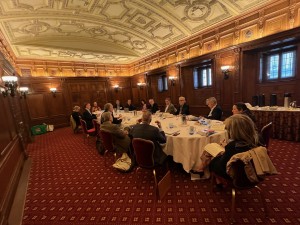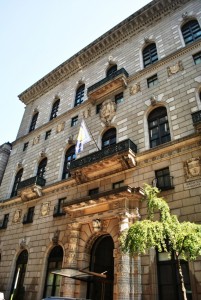Machiavelli’s Continuous Renaissance
Professor Steven B. Smith, Yale University
Professor David Ragazzoni, University of Toronto
Professor Francesca Trivellato, The Institute for Advanced Study
Professor Vickie Sullivan, Tufts University
Professor Michelle Greene, Dartmouth College
EverScholar in Cambridge, MA
October 9-12, 2025
Course fee: $2395
EverScholar takes us to the familiar and the unknown; to the beautiful and the repulsive; to good and evil. In this program, we journey – not physically, but through our readings, discussions, and superb faculty – to a time of the greatest beauty and the loftiest ideas, much of which took place in a city which was and remains too magnificent to be real. We look at all of these through one of its most notorious practitioners, who himself embodied contradiction, talent, and most of all, impact, in ways that are uncannily relevant and surprisingly surprising.
One of the greatest hurdles to reading Niccolò Machiavelli (1469-1527) is that we already think we know what he means before we even start reading a single page. Machiavelli’s name has become synonymous with deceit, cunning, lying, and betrayal; he is conventionally associated with a hard-headed if not to say hard-hearted realism, and a belief that what ultimately matters in politics is the ability of leaders to prove successful, no matter how ruthless or brutal their course of action might be.
It would do both a great injustice to Machiavelli and a major disservice to his readers not to question these cliches. Contrary to common opinion, Machiavelli’s The Prince is not a handbook for tyrants (as is sometimes depicted). He never wrote that “the end justifies the means” (a line for which he is routinely credited and yet is nowhere to be found in his work). Rather, his writings stand among the most revolutionary texts of modern political theory, propelling a novel understanding of popular government that profoundly influenced the founders of modern republics on both sides of the Atlantic. And his urge to model politics after “the effectual truth of the thing rather than the imagination of it” (as he famously put it in Ch. 15 of The Prince) propelled a path-breaking approach to public affairs that significantly shaped the later trajectory of political thought and practice alike.
Machiavelli’s fame rests on the claim – universally acknowledged – to have created a new science of politics, to have discovered “new modes and orders,” to have done for politics what Columbus had done for geography (as he vividly put it in the preface to his Discourses on Livy). Yet what this science consists of remains deeply contested. He is widely associated with the idea of power politics.
A former chancellor of the Florentine Republic penning his most important writings in exile while dreaming of his comeback in public affairs, Machiavelli approached politics with the high sense of possibility and adventure that we typically associate with the Renaissance. Although the term “Renaissance” literally means rebirth, it was also a time of extraordinary innovation. More than, simply, a recovery of the old, it was a harbinger of the new, and Machiavelli’s work encapsulates this promise, speaking the language of political innovation, renewal, and even redemption. Machiavelli thought of politics as a work of art, as a product of the human will and artifice, as the realm where certain newfound powers of creativity and human agency attain full display.
Our purpose in this course will be to explore the many dimensions of Machiavelli’s novelty, reclaiming its complexity and nuance against simplistic and one-dimensional readings. We will mine his different writings against the backdrop of Renaissance Florence and its political and intellectual history under the (in)famous Medici dynasty. We will examine the connected themes of innovation, political founding, greatness and decline, the relationship between morality and politics, the importance of public opinion for political leaders, and the role of chance and virtù in human affairs through the pages of his most referenced book (The Prince). We will analyze his account of ancient and modern republics, their complex balance between freedom at home and imperialistic expansionism abroad, the ambivalence of socio-economic conflict, the nature and perils of sects and factions, the role of religion, the varieties of political conspiracies, and his overall philosophy of history through a comparative reading of his extensive work on ancient Rome (Discourses on Livy), his historical account of his native Florence (Florentine Histories), and some of his most famous letters.
Finally, we will debate the works of some among the most influential interpreters of Machiavelli, tracing the afterlives of his ideas both in political philosophy and on the battleground of political ideologies and offering a sample of the countless appropriations, (mis)readings, and critical encounters with his work across centuries.
Was he a “teacher of evil”, as the Jacobean writers and the American political philosopher Leo Strauss contended in the late 18th and the mid-20th century? Was he a republican and a patriot (as Jean-Jacques Rousseau believed during the French Enlightenment), a nationalist (as the German idealists Fichte and Hegel argued at the turn of the 19th century), a proto-communist (as Antonio Gramsci claimed in Fascist Italy)? Was he a theorist of elite rule, a supreme proponent of power politics and Realpolitik in the mold of Bismarck or Henry Kissinger? Or is he best understood as a radical democrat, whose teachings can promote popular re-empowerment and stronger political accountability in early 21st-century liberal democracies (as some interpreters have recently suggested)?
As the title of our course suggests, the kaleidoscopic visions of Machiavelli that have proliferated over the past 500 years are testament to his continuous renaissance. They reveal the enduring echo of his signature ideas across boundaries – past the timeframe of the Renaissance, outside the milieu of Medicean Florence, and well into our troubled present and beyond.
Our faculty represent an immense bounty of Machiavelli expertise. Drawn from five of the finest, yet diverse, institutions, and with their own distinctive perspectives on the topics, they come together in collaboration and conversation to dive deep, together with you and your fellow EverScholars, with new and unexpected insights sure to rise to the surface. Read more about this incredible collection of talent, enthusiasm, and joyful pedagogues below. And join us for an intellectual exercise like no other.
Our Lead Faculty:
Our Guest Faculty:
All EverScholar courses actually start months before our meeting. After registration, you will receive all books and scholarly articles for the course, and will immerse yourself in great works curated by our faculty. “Machiavelli’s Continuous Renaissance” is no exception, with works ranging from contemporaneous writings to great books written by your own EverScholar professors. Primary sources will mix with authoritative texts to produce night after night of joy as you prepare for your return to the life of the mind.
Special Events
One of EverScholar’s unique and most beloved features are our Special Events; sessions at a number of well-known (such as a museum or Art Gallery) or less-known centers of collection and learning. “Machiavelli’s Continuous Renaissance” continues this tradition.
Details on Special Events for this course will be posted soon; well in advance of the course.
Beyond the Classroom
Everything that happens during an EverScholar program is enhanced by the fact that it takes place in a learning-promoting environment.
This program takes place in the Cambridge/Boston area and we anticipate utilizing the facilities of institutions such as Harvard and MIT, where we have hosted programs in the past. Discounted housing will available.
Learn more about the experience!



The course begins with a reception and dinner on Thursday…. and ends late Sunday afternoon. The program cost is $2,395 per person. Deposit is $500 per person. Balance is due on July 1, 2025. Refund and full COVID-19 refund policies are detailed on registration page (click on “Register Now” button above for this information along with accommodation details) – you can register without worries. Looking forward to seeing you there!





